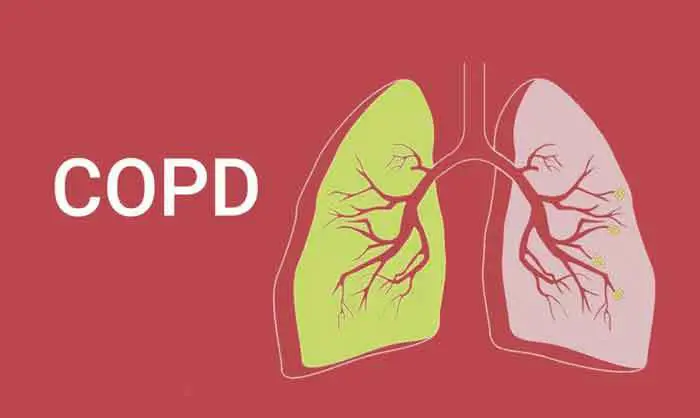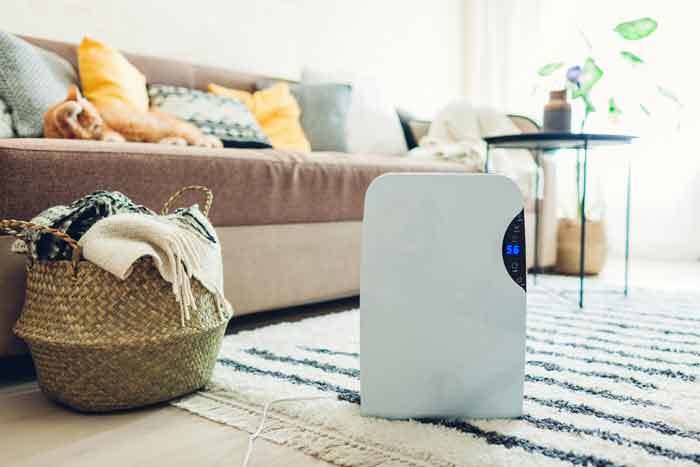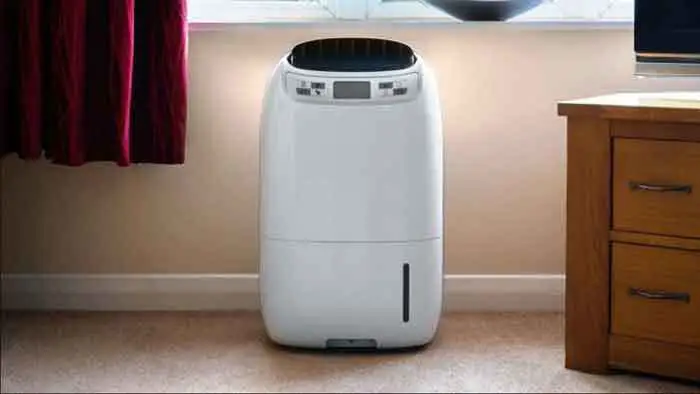Is A Dehumidifier Good for COPD? – A COMPLETE Guide

As a patient with chronic obstructive pulmonary disease (COPD), the quality of the air you breathe may very well be a matter of life and death.
You can’t afford to be careless or clueless – your health is on the line!
Which is why you’re on this website: you’re looking around for gadgets and appliances that can help improve your quality of life, and maintain your health.
One of the units you’ve probably considered installing into your home is the dehumidifier, which draws out moisture from the air and collects it into a basin to be thrown out later.
Should you really invest in a dehumidifying unit for your home, and will it help in your fight against the symptoms of COPD?
Read on to find out if a dehumidifier is good for COPD.
More...
First, what does a dehumidifier do?

One of the common factors that leads to homeowners buying a dehumidifier is the growth of mold within the home.
If you’ve noticed a little leakage from your pipes or some dark spots along the bottom of your walls, then the mold spores have probably already claimed your house as their own, and by then, most of you will turn to dehumidifiers to help you get rid of them.
Dehumidifiers are also useful for removing that dank, musty smell that greets you every time you come home from work, which is usually evidence of mold and mildew growing indoors.
For those of us who live in particularly tropic areas, dehumidifiers are a must-have.
However, even if you live in a perfectly even climate, a dehumidifying unit can still prove useful, especially if you’re into cooking.
The smoke and oils from your culinary activities are sure to bring imbalance to your indoor air quality, so consider looking into a dehumidifier that’s perfect for your kitchen.
But what about those of us who suffer from COPD?

If you’re worried about finding the right level of humidity in your home, then good!
You’re already on the right path, because an extremely high level of humidity can indeed cause you to suffer from a flare-up.
A flare-up is when the symptoms of your disease worsen, seemingly for no reason.
During a flare-up, you may:
What’s causing your flare-ups? Flare-ups can be triggered by a number of different things.
These can be things that are out of your control, like pollution, extreme climates, and tiny irritants that you can’t even see.
But you can also avoid some of the triggers, like smoke from cigarettes, strong perfumes, and artificial scents.
Another possible cause of your flare-ups may be something that you haven’t even considered: the level of humidity within your home.
Is humidity compromising my health?

A very low humidity can hurt you just as much as high humidity can.
When you inhale dry air, it can cause your bronchi to spasm in what’s called bronchospasm.
Your bronchi is what allows air into your lungs, so when bronchospasm occurs, your airways narrow, resulting in difficulties with inhaling.
However, high humidity shouldn’t be scoffed at, either. Humid air is dense because of its high water content.
This density fights against your efforts to inhale, and so you may find it harder to breathe whenever your environment is hot and humid.
Hot weather, when coupled with humidity, also gives your body a hard time when it comes to taking in oxygen.
When you feel hot, your body works extra hard to help you sweat and stay cool.
This process causes your body to exert more energy, thus leading you to feel fatigued more easily.
Increased humidity within your home also acts like an invitation for mold to take root within your home, and the musty smell that mold growth gives off can cause your flare-ups.
Mold spores are also dangerous when inhaled.
Is there anything I can do to avoid humidity-triggered flare-ups?

Because humidity is often a factor in the weather which you can’t possibly control, the best thing you can do is to avoid going out in weather that does not agree with you.
When the weather outside feels humid, avoid going out or bring a water bottle with you.
Remember that it’s easier to get tired in hot weather!
On the other hand, if the weather is cold, wear a scarf over your nose to help warm the air before it passes through your airways.
You can’t control the weather outdoors, but you can control the humidity levels within your home!
If you decided to stay home on a day with particularly extreme weather, but still feel that hiding behind closed doors isn’t enough and that your breathing is still being compromised, consider purchasing a dehumidifier.
Question is, how is a dehumidifier good for COPD and if so, when should one use it?
Is A Dehumidifier Good for COPD?

After reading the possible effects that a high level of humidity might have on your COPD, you may be itching to buy your own dehumidifying unit now.
But be warned!
You may not actually be in need of a dehumidifier, so don’t go out to purchase a unit just yet.
Because the levels of humidity in your home depends greatly on the area in which you live, first you yourself must assess whether or not you are actually in need of a dehumidifier.
Remember, a high humidity is indeed bad for you, in which case a dehumidifier can prove to be beneficial.
But if you live in a dry area and install a dehumidifying unit for your home, then you may very well be putting your health in even greater risk!
So how do I know whether or not I actually need a dehumidifier?

There are a few questions you may ask yourself to find out if a dehumidifier can help with your health, and with keeping the air quality within your home in peak condition.
First, know that you only need a dehumidifier if the air in your home has high humidity levels, so you must find out whether your indoor environment is humid:
- 1Does your home have a weird, musty smell whenever you walk in?
- 2Have you noticed any dark spots on the walls or the ceilings?
- 3Do your pipes leak often?
- 4Have you been having flare-ups, seemingly for no reason at all?
- 5Are there any wooden furniture in your home that have gone soft to the touch?
- 6Are your windows foggy?
If you answered yes to most of these questions, then there’s a good chance that your indoor air environment is humid and you are in need of a dehumidifier.
In this case, congratulations!
You just eliminated one possible cause of flare-ups within your home.
But if you answered no to most of these questions and you think that your home isn’t humid at all, then hold off on buying that dehumidifier, otherwise you’ll create an even drier indoor environment that may trigger your COPD symptoms.
Conclusion: Is A Dehumidifier Good for COPD?

As a COPD patient, one of the things you must keep careful track of is the quality of the air you breathe in at home, which is why you’ve been wondering whether you should install a dehumidifying unit in your house.
After all, you’re not sure whether your flare-ups are being caused by your indoor humidity levels or any of these factors that are out of your control, like climate, pollution, and pollen.
But humidity is in your control – at least, the humidity within your home is.
Too high or too low levels are both bad for you; the latter may cause bronchospasm and can tire you out easier, while the former makes it harder for you to breathe and can even invite mold into your home.
You can avoid these effects that the outdoor weather can bring about, but if you’re staying home and you still feel that your health is compromised thanks to extreme levels of humidity, then consider buying appliances that can help you solve your problem.
Is a dehumidifier good for COPD? Yes, it can help!
But remember, dehumidifiers are for if you feel that your home is extra humid, and if not, then consider a humidifier!
Dehumidifiers are not a cure-all for your COPD, and if you purchase one without really needing it, then you may be putting yourself in greater risk.
